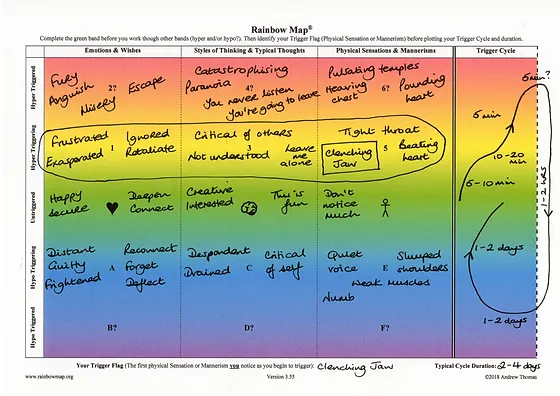Strategies after Depression: Distractions, Rainbow Mapping and Bilateral Music
My last counsellor (number 3!) was by far my favourite. Despite being discharged, she left me with some coping strategies to utilise in times of need. Three of these I want to share because I really do think that they help me.
She set me a challenge to do something fun every week and I've taken it as a rule in life ever since. If I have nothing fun planned, I try to put something in, even if it's just for a few hours. It can be a great distraction to get out of my inner self and focus on the joys in life, instead of getting into that downward spiral of self-depreciation.
She also left me with two other activities I have to fall back on if the time ever requires. The first is rainbow mapping. Now initially, this wasn't something that struck me as something that I would find useful but over time it has grown on me and I can see how some would find it supportive. It's basically a way to chart your emotions via a colour coded worksheet, taking you from hyper arousal to depressive lows. This website explains it the best as a way to develop self-awareness, notice your symptoms earlier and more reliably and to reduce the intensity and duration of these by improved mental strength.
Bilateral music is the second technique and this one I have loved. Used as a part of Eye Movement Desensitization Reprocessing (EMDR) therapy, I've already recommended it to a few friends that have been struggling intermittently. It is a type of music that works best when listened to using headphones This causes the music to alternate between the left and right ears. This alternate stimulation of each side of the brain can be helpful when people have anxiety, stress or trauma, as humans are designed to orient towards sounds. This gentle activation of the vestibular system of the body causes for non-invasive calming of the limbic brain.
A similar alternative is called binaural beats, which play slightly different sounds in each ear, while bilateral beats move sounds back and forth between your left and right ears. Both types of beats can help your brain find balance and harmony. As you listen to this music, your body responds by releasing calming chemicals and lowering your heart rate.
I was recommended to listen to bilateral music for 30 - 60 minutes before bed, to relieve depression, PTSD, insomnia, overwhelment and more. I've found especially after night shifts it works incredibly well, whilst I've also enjoyed having it as background music whilst concentrating on university work.

Comments
Post a Comment